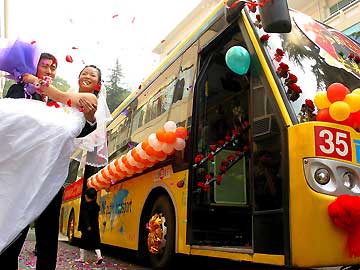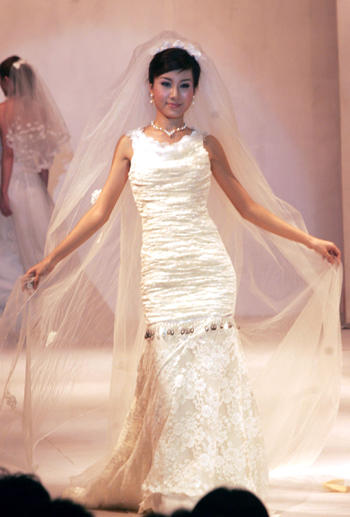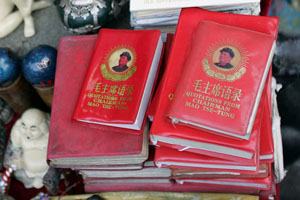Expensive Relationships
With the National Day (October 1) approaching, many people have become a little worried about their wallets.
A bridegroom is ready to carry his bride into a rented public bus in Nanjing, Jiangsu Province, to start their wedding celebration.

A bridegroom is ready to carry his bride into a rented public bus in Nanjing, Jiangsu Province, to start their wedding celebration. |
According to Chinese tradition, the National Day holiday is a popular time for holding wedding ceremonies and those receiving invitations are expected to give gifts and/or money to each new couple.
"I received two invitations, which means an expense of at least 1,000 yuan (US$123)," said Jane Xu, a local white collar. "It's routine now, you can't go to a wedding banquet without offering gift money."
Chinese people like to call their homeland a "country of manners," with etiquette constituting a very important part of social activity. Among these manners, gifts play an essential role, because "it is not good manners to receive a gift but never return anything back."
Marriage, is known as one of the four happiest things in one's life (the other three being achievement in examinations, meeting old friends away from home and rainfall after a drought). It has long been a complicated process of giving and receiving gifts.
Marriage Old and New
More than 2,000 years ago, China already had recorded principles for wedding gifts among high-status families. Among the many gifts, two seem very interesting: a a wild goose and tea.
The wild goose flies south every autumn and flies back the next spring, so it is considered to be a bird that keeps its promises.

A model displays a wedding gown at the second Wedding Expo in Beijing, Aug. 13, 2005. The Wedding Expo was held at the Beijing Exhibition Center from Aug.12 to Aug 14. International trend of wedding costumes, Chinese wedding custom and marriage-related service items would be displayed during the three-day expo in Beijing. |
A model displays a wedding gown at the second Wedding Expo in Beijing, Aug. 13, 2005. The Wedding Expo was held at the Beijing Exhibition Center from Aug.12 to Aug 14. International trend of wedding costumes, Chinese wedding custom and marriage-related service items would be displayed during the three-day expo in Beijing.
Tea, a very important gift in ancient times, symbolizes long-lasting love and sincerity. Because the tea tree dies if it is removed from its original place, it stands for fidelity, of the kind the new couple should show to each other.
The many customary practices and traditions made weddings complicated in ancient China. The families of both groom and bride were required to carefully prepare gifts for each other.
After the special day had been decided, the groom's family would prepare cash, pies, snacks, livestock such as pigs or chickens, fruits with auspicious meanings or pronunciations and jewellery for the bride.
The bride's family, of course, prepared gifts in return. They were expected to give back gifts worth at least half the value of those received, including such items as men's clothes, articles of daily use and food.
Three days after the marriage, the new couple would return to the bride's home, and gifts were an important part of this too. Most of the gifts at this stage were food items, such as wine, meat, pies and vegetables.
During the 1930s, modern Shanghai was the vanguard of a revolution in "new living," which aimed to discard old and useless traditions.
On April 3, 1935, the city held the country's first group wedding ceremony in the hall of the city government in Jiangwan.
According to the record of the China Archives Newspaper, 57 couples in identical dress (men in blue gowns and black top wear, women in pink qipaos) entered the hall accompanied by music.
They first bowed to the sculpture of Sun Yat-Sen, then bowed to each other, and finally bowed to the chief witness at the wedding ceremony. Then the new couples walked out of the hall for group photographs in the plaza.
This new style of marriage attracted many residents and hundreds of people crowded to the plaza to see the event.
Such simple wedding ceremonies became stylish in society, with many film stars and modern young people applying to marry in the same way. The complicated process of giving and receiving wedding gifts was neglected by some modern families.
Revolutionary Gifts
After liberation in 1949, cash was considered an evil. People were busy with political activities and wedding gifts at that time also had a political flavour.

Hard-covered books of Mao's sayings or newly-designed badges bearing Mao's head are very popular gifts at weddings during the 1970s. |
Today, many young people break into laughter when watching a TV programme about the "Cultural Revolution" (1966-1976) when people offered books of Mao quotations and Mao badges as wedding gifts.
"It's true, at that time hard-covered books of Mao's sayings or newly-designed badges bearing Mao's head were very popular gifts," said Sheng Chongming, in her 50s.
A new couple married during that period might easily receive dozens of such revolutionary books and badges. All would be displayed in an eye-catching place in their new home to show high respect to Chairman Mao.
Of course, daily use articles such as basins, towels and thermos bottles were among young people's favourite gifts. Most of these articles were printed with one or two sentences of revolutionary slogans or quotations from Chairman Mao in bright red such as "Serve the people with heart and soul" or "Sailing in the ocean requires a helmsman."
After the "Cultural Revolution" marriages became practical again due to material shortages. "At that time, the things we wanted were quilts, furniture and small household articles," said Sheng, who married in 1976.
At that time, most goods were on rationing lists, including food, clothing, cotton, meat, sugar, oil and other items of daily use. Rationing didn't end until the beginning of the 1990s.
The best gift for a new couple was a ration ticket for cloth, cotton, a bicycle or some kind of basin. Sewing machines or clocks were seen as very luxurious articles for a new house.
In reciprocation to relatives and friends who gave money gift (only about 10 yuan) or ration tickets, the new couple would give a small bag of "happy candy," containing eight candies (four cheap fruit candies and four expensive creamy candies) to each guest.
Modern Simplicity
Wedding gifts have become even simpler with the passage of time. Now, money talks.
"I received about 50,000 yuan (US$6,173) in gift money from relatives and friends," said Yu Xuebin, 30, who married months ago. "But most of the money I received will be returned back when others marry."
In China today, the invitation to a wedding ceremony "a printed on a red card" is called "red bombing." When you receive such an invitation, it means you have to pay several hundred yuan, said Rio Xie, 28.
In today's Shanghai, the wedding gift money required for an ordinary friend or relative comes to at least 200 yuan (US$25). It is at least 500 yuan (US$62) for a good friend or close relatives, but gifts of over 1,000 yuan (US$123) are not rare.
"I don't think it is good to give money, though many people think money is the most practical gift," Xie said.
"You receive it this time and you find an opportunity to return it next time. In addition, money is just paper without emotional character, flowers or trendy household appliances would be a much better gift for a new couple."
(Shanghai Star September 28, 2005)

